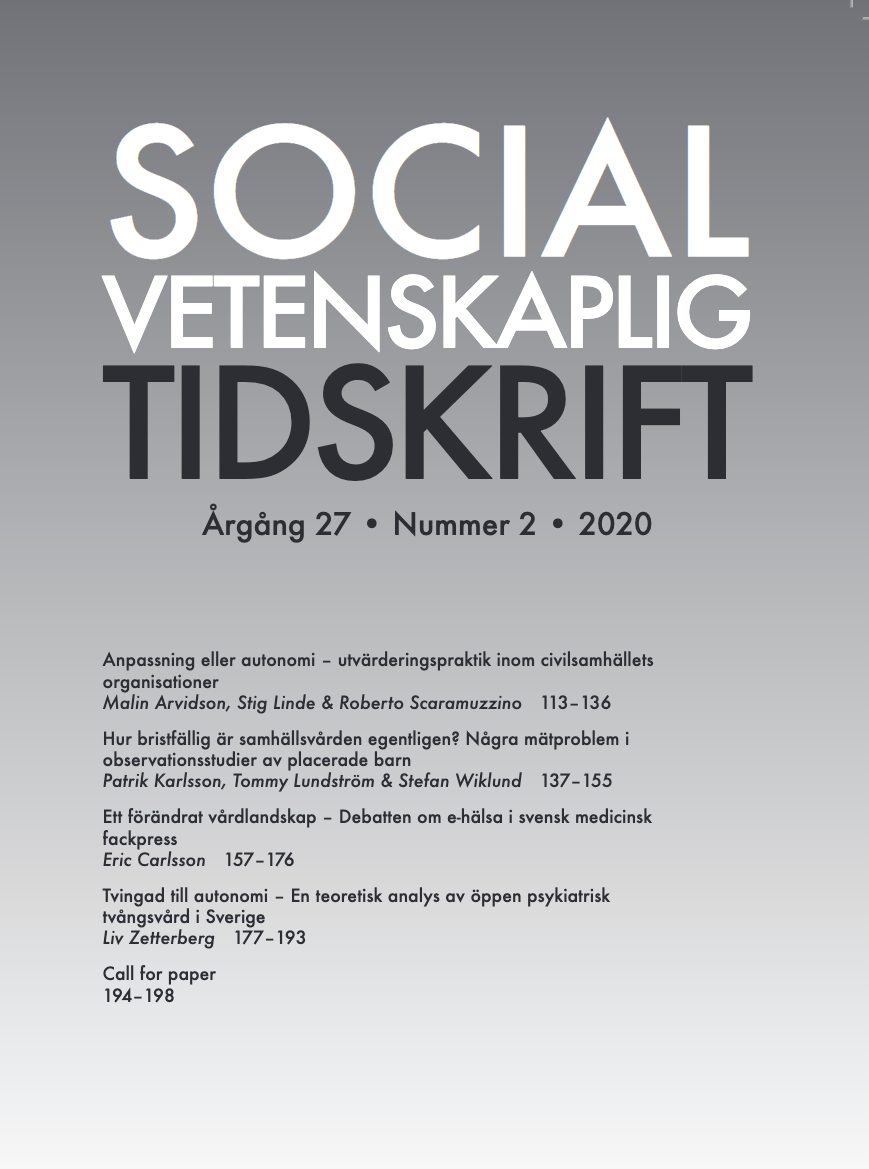Anpassning eller autonomi
–utvärderingspraktik inom civilsamhällets organisationer
DOI:
https://doi.org/10.3384/SVT.2020.27.2.3518Abstract
Internationella studier om villkoren för civila samhällets organisationer (CSO) belyser hur deras relation till offentlig sektor avgör karaktären på organisationernas utveckling. Den här artikeln bidrar till forskning inom området på två sätt. För det första utforskar studien svenska CSO som är verksamma inom det sociala området och hur deras relation till offentlig sektor påverkar deras utvärderingspraktik. Baserat på en enkätstudie riktad till CSO undersöker vi om organisationers granskning och utvärdering av den egna verksamheten kan ses som ett uttryck för institutionellt tryck, där relationen till offentlig sektor driver CSO:s utvärderingspraktik. Vikten av att uppmärksamma detta kommer ur antaganden att utvärderingsprinciper baserade på det offentligas logik, det vill säga kostnadseffektivitet, evidensbaserad praktik och konkurrensutsättning, kan hota organisationernas värdeintegritet; genom anpassning riskerar CSO att förlora särart och oberoende. För det andra bidrar studien till diskussioner som berör teoretiska antaganden att bidragsberoende, tvång på grund av kontraktsbaserade relationer eller ett verksamhetsområde präglat av lagstiftning påverkar organisationers strategier för avancerad utvärdering. Analysen stärker dock enbart antagandet om att närhet till lagstyrt verksamhetsområde präglar CSO:s utvärderingspraktik. Analysen stärker alltså inte antaganden om att resursberoende (med undantag för bidrag från landsting) och kontraktsbaserad relation påverkar CSO:s utvärderingsstrategier. Resultaten leder oss till att uppmärksamma hur relationer mellan offentligt och ideellt förstås utifrån ett historiskt perspektiv där just begreppet närhet kan rymma både instrumentella och inneboende värden. Den kunskapen är värdefull för vår förståelse av den svenska kontexten. Att studiens antaganden inte får stöd av analysen kan tolkas som ett uttryck för en relation mellan CSO och offentlig sektor som är präglad av ömsesidig förståelse, snarare än sådan maktasymmetri som följer resursberoende och avtalsbaserade relationer. Kunskapen är ett bidrag till forskningsdebatten om den institutionella kontextens påverkan på organisationer i fallet CSO, eftersom den uppmuntrar till en mer detaljerad bild av det institutionella tryckets dimensioner som består av både historiska och tidsbundna kontraktsbaserade relationer.
Downloads
Publicerad
Referera så här
Nummer
Sektion
Licens
Allt material i Socialvetenskaplig tidskrift publiceras sedan 2022 (Vol 28 Nr 2) med omedelbar öppen tillgång (open access), under Creative Commons-licensen CC BY 4.0. Upphovsrätten till innehållet tillhör respektive författare.
Allt innehåll i tidskriften är fritt tillgängligt utan kostnad och får fritt läsas, laddas ned, kopieras, delas, skrivas ut och länkas. När innehållet används måste författare, källa och licens anges. Författaren kan fritt göra sin publicerade text tillgänglig på institutionella och internetbaserade arkiv, exempelvis sitt lärosätes digitala arkiv eller andra tjänster för detta.
Inga publiceringsavgifter tas ut vid publicering i Socialvetenskaplig tidskrift.


